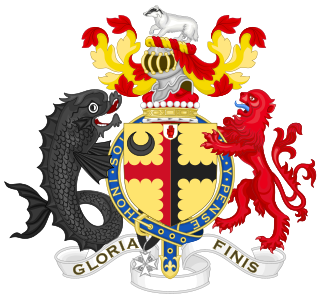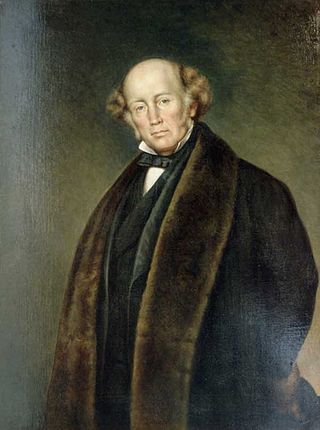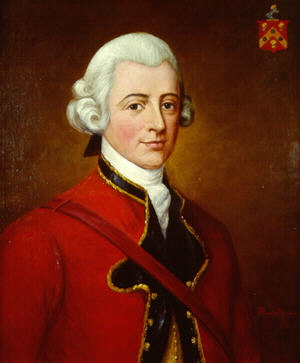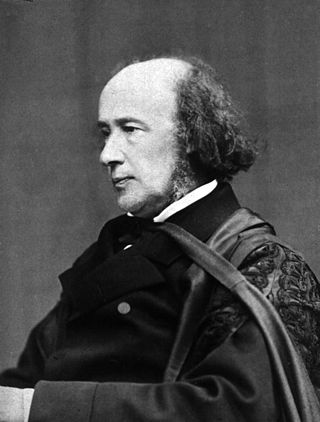
Earl St Aldwyn, of Coln St Aldwyn in the County of Gloucester, is a title in the Peerage of the United Kingdom. It was created in 1915 for the prominent Conservative politician Michael Hicks Beach, 1st Viscount St Aldwyn, known from 1854 to 1907 as Sir Michael Hicks Beach, 9th Baronet, of Beverston. He was Chancellor of the Exchequer from 1885 to 1886 and again from 1895 to 1902. Hicks Beach had already been created Viscount St Aldwyn, of Coln St Aldwyn in the County of Gloucester, in 1906, and was made Viscount Quenington, of Quenington in the County of Gloucester, at the same time he was given the earldom. Both titles are in the Peerage of the United Kingdom. He was succeeded by his grandson, the second Earl, the son of Michael Hicks Beach, Viscount Quenington, Member of Parliament for Tewkesbury, who was killed in action in 1916. Lord St Aldwyn was also a Conservative politician and was Captain of the Honourable Corps of Gentlemen-at-Arms between 1958 and 1964 and 1970 and 1974. As of 2018 the titles are held by his eldest son, the third Earl, who succeeded in 1992.

Viscount Brookeborough, of Colebrooke in the County of Fermanagh, is a title in the Peerage of the United Kingdom. It was created in 1952 for the Ulster Unionist politician and Prime Minister of Northern Ireland, Captain The Rt. Hon. Sir Basil Brooke, 5th Bt., P.C. (N.I.), M.P.

Baron Bagot, of Bagot's Bromley in the County of Stafford, is a title in the Peerage of Great Britain. It was created on 12 October 1780 for Sir William Bagot, 6th Baronet.

Sir Edmund Walker Head, 8th Baronet, KCB was a 19th-century British politician and diplomat.

Sir William Jenner, 1st Baronet, GCB, QHP, FRCP, FRS was a significant English physician primarily known for having discovered the distinction between typhus and typhoid.

Rear-Admiral of the United Kingdom is a now honorary office generally held by a senior Royal Navy admiral, though the current incumbent is a retired Royal Marine General. Despite the title, the Rear-Admiral of the United Kingdom is usually a full admiral. He is the deputy to the Vice-Admiral of the United Kingdom, who is in turn deputy to the Lord High Admiral of the United Kingdom.

The Eden Baronetcy, of West Auckland in the County of Durham, and the Eden Baronetcy, of Maryland in North America, are two titles in the Baronetage of England and Baronetage of Great Britain respectively that have been united under a single holder since 1844.

Sir William Hillary, 1st Baronet was a British militia officer, author and philanthropist, best known as the founder, in 1824, of the Royal National Lifeboat Institution.

There have been four baronetcies created for persons with the surname Rose, all in the Baronetage of the United Kingdom. Three of the creations are extant as of 2010.

Edward Pryce Lloyd, 1st Baron Mostyn, known as Sir Edward Lloyd, 2nd Baronet from 1795 to 1831, was a British politician.
Sir Stephen Edward De Vere, 4th Baronet was an Anglo-Irish, Whig Party, Member of Parliament for County Limerick, who in the Famine year 1847 bore personal witness to the conditions aboard the "coffin ships" that carried Irish emigrants to North America, and who converted to Roman Catholicism.

The Blunt Baronetcy, of the City of London, is a title in the Baronetage of Great Britain. It was created on 17 June 1720 for John Blunt, the famous perpetrator of the South Sea Bubble, for his good work for the nation of Great Britain. From 1703 he was the secretary of the Hollow Sword Blade Company, a joint-stock company effectively operating as a bank. He was a director of the South Sea Company from 1711. He was the main architect of the ambitious scheme for the company to assume the National Debt, and when the bribery and fraud were revealed, Parliament confiscated all his assets except £5,000, while most directors were allowed to retain £10,000.

Sir Henry Wentworth Dyke Acland, 1st Baronet, was an English physician and educator.
William Meredyth Somerville, 1st Baron Athlumney, 1st Baron Meredyth PC, known as Sir William Somerville, Bt, between 1831 and 1863, was an Anglo-Irish Liberal politician. He was born in 1802.

Sir Edward Graham Moon, 2nd Baronet, was an English rower and clergyman.

Richard Bulkeley Philipps Philipps, 1st Baron Milford, known as Richard Grant until 1823 and as Sir Richard Philipps, Bt, from 1828 to 1847, was a Welsh landowner and Whig politician.

The Anson family is a British aristocratic family. Over time, several members of the Anson family were made knights, baronets and peers. Hereditary titles held by the Anson family include the earldom of Lichfield and the Anson baronetcy. Over time, several members of the family have risen to prominence, including Admiral of the Fleet George Anson, 1st Baron Anson, PC, FRS (1697–1762) and the society photographer Patrick Anson, 5th Earl of Lichfield (1939–2005).

Sir Robert Frankland-Russell, 7th Baronet (1784–1849) was an English politician, known also as an artist. In early life he was called Robert Frankland.
















